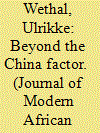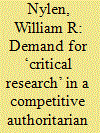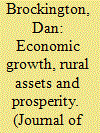|
|
|
Sort Order |
|
|
|
Items / Page
|
|
|
|
|
|
|
| Srl | Item |
| 1 |
ID:
159556


|
|
|
|
|
| Summary/Abstract |
China has become a significant contributor to closing Africa's infrastructural gap, but Chinese companies are repeatedly criticised for not involving local businesses in their operations, and for isolating themselves from the socio-economic environment. Can this be attributed to ‘typical Chinese business practice’? This article employs linkage theory to examine the weak domestic backward linkages in Chinese-led construction projects in Mozambique. The analysis shows that while Chinese companies do not involve Mozambican businesses in their activities to any extent, this cannot be attributed solely to any ‘Chinese business model’. It is a consequence of weak local industrial capabilities, fragile social infrastructure and a liberal policy environment not conducive to the creation of domestic backward linkages in Chinese-led construction projects.
|
|
|
|
|
|
|
|
|
|
|
|
|
|
|
|
| 2 |
ID:
159554


|
|
|
|
|
| Summary/Abstract |
Think tanks in competitive authoritarian regimes are implicitly if not explicitly oppositional, producing and disseminating research critical of government policies and elite behaviour. Existing literature asks how and why such think tanks emerge and survive, and if they exercise real influence. This paper asks if anyone actually reads their critical research. Focusing on two cases in Mozambique – the Instituto de Estudos Sociais e Económicos (IESE) and the Centro de Integridade Pública (CIP) – three original data sets are examined: (1) citations in the bibliographies of end-of-programme theses of undergraduates in the political science, public administration, economics, and/or sociology departments of two of Mozambique's most important universities; (2) websites and Facebook activities – visits, downloads, etc.; and (3) citations in academic journals that publish on Africa. Findings show evolving demand for these think tanks’ research, suggesting their growing status within Mozambique and, by implication, within civil societies of similar competitive authoritarian regimes.
|
|
|
|
|
|
|
|
|
|
|
|
|
|
|
|
| 3 |
ID:
159552


|
|
|
|
|
| Summary/Abstract |
Measures of poverty based on consumption suggest that recent economic growth in many African countries has not been inclusive, particularly in rural areas. We argue that measures of poverty using assets may provide a different picture. We present data based on recent re-surveys of Tanzanian households first visited in the early 1990s. These demonstrate a marked increase in prosperity from high levels of poverty. It does not, however, follow that these improvements derive from GDP growth. We consider the implications of this research for further explorations of the relationship between economic growth and agricultural policy in rural areas.
|
|
|
|
|
|
|
|
|
|
|
|
|
|
|
|
| 4 |
ID:
159553


|
|
|
|
|
| Summary/Abstract |
The popularity of unity governments to settle both internal political divisions and outright conflict has grown in the last 20 years. However, more often than not unity governments fail to mitigate the political dynamics baked into the political economies and suffer from being insufficiently anchored in local society. The Government of National Unity (GNU) in Zanzibar, formed in 2010 as the culmination of the ‘maridhiano’ political reconciliation process and following numerous attempts at reconciliation led to initial successes, is a case in point. Zanzibar's GNU turned out to be ‘position’ rather than ‘power’ sharing, constitutionalised through a hybrid format of the politics of continuity and collusion. As such the position sharing system broke down when voters in the 2015 election sought neither continuity nor collusion, but transformational change of governance. This was in turn blocked by veto actors in favour of continuity, resulting in the collapse and discontinuation of the GNU in Zanzibar.
|
|
|
|
|
|
|
|
|
|
|
|
|
|
|
|
| 5 |
ID:
159555


|
|
|
|
|
| Summary/Abstract |
Tanzania and Uganda are among the most cited countries employing reserved-seat quotas. They adopted these quotas in 1985 and 1989, respectively. However, the two countries use different mechanisms to recruit reserved-seat members of parliament (MPs). Drawing on interview data from Tanzania and Uganda, this study compares the two models in terms of their effectiveness in facilitating the transfer of female MPs to non-quota seats in subsequent elections, thereby furthering women's sustainable representation. We find that the Tanzanian model is superior because it compartmentalises quota MPs in reserved seats less than the Ugandan model. The Ugandan model creates a gendered perception that constituency seats are for males and quota seats are for females – as if each sex has a distinct category of parliamentary seats. This perception affects each step of the switch to a non-quota seat, from the decision to switch to party nominations to voters’ decisions at the polls.
|
|
|
|
|
|
|
|
|
|
|
|
|
|
|
|
| 6 |
ID:
159551


|
|
|
|
|
| Summary/Abstract |
Land law reform through registration and titling is often viewed as a technocratic, good-governance step toward building market economies and depoliticising land transactions. In actual practice, however, land registration and titling programmes can be highly partisan, bitterly contentious, and carried forward by political logics that diverge strongly from the market-enhancing vision. This paper uses evidence from Côte d'Ivoire to support and develop this claim. In Côte d'Ivoire after 1990, multiple, opposing political logics drove land law reform as it was pursued by successive governments representing rival coalitions of the national electorate. Between the mid-1990s and 2016, different logics – alternatively privileging user rights, the ethnic land rights of autochthones, and finally a state-building logic – prevailed in succession as national government crafted and then sought to implement the new 1998 land law. The case underscores the extent to which deeply political questions are implicated in land registration and titling policies.
|
|
|
|
|
|
|
|
|
|
|
|
|
|
|
|
|
|
|
|
|